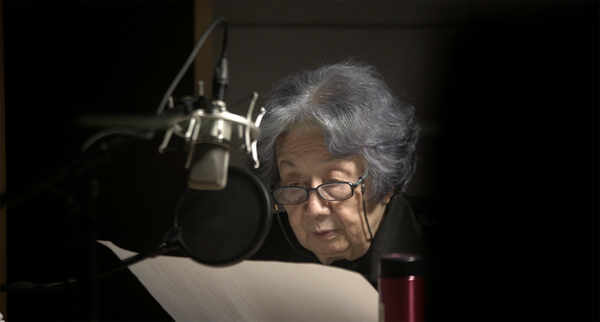
The documentary film Like the Dyer's Hand retraces the turbulent experiences of Florence Chia-ying Yeh and her lifetime devotion to the study of Chinese poetry. [Photo provided to China Daily]
Like the Dyer's Hand, a documentary film on scholar Florence Chia-ying Yeh, made its global debut on Friday, one day ahead of the 101st anniversary of Nankai University in Tianjin.
The 96-year-old who now lives on Nankai's campus says it's the only film that she has approved on her turbulent life experiences in Beijing, Taipei, Canada, the United States and Tianjin, and her insights into Chinese poetry, her main subject of study.
It took Taiwan director Chen Tsun-shing three years to make the film. The crew interviewed Yeh 17 times, and each interview often lasted several days, usually beginning around 9 am and continuing until 11 pm, with an afternoon break.
Yeh often prepared the material for information on her early life until late in the night, according to Shen Yi, the filmmaker.
After the interviews, the recorded footage hit 980,000 words. The film was shot in Beijing, Tianjin, Xi'an, capital of Northwest China's Shaanxi province, Luoyang in Central China's Henan province, Hong Kong, Taipei, Vancouver and Boston. The crew met with dozens of Yeh's friends, students and relatives, including writers Pai Hsien-yung and Hsi Muren.
"We wanted to vividly showcase her full life and personal charisma," Shen says.
Sun Xianghui, curator of the China Film Archive, says the film, infused with the rich history of Chinese poetry and Yeh's experience, "is an epitome of Yeh's efforts to inherit the Chinese cultural spirit".
Liao Mei-li, founder of Taiwan's Eslite Bookstore and the initiator of the film project, says, "The documentary demonstrates Yeh's spiritual power and moral beauty."
At a public event in Nankai University, Yeh says Chen is not only a film director but also a semiology researcher who completed his studies in France before working in Taiwan's film sector. To Chen, the film is not only a personal story of Yeh but also a review of the history of Chinese poetry.
Yeh's personal experience explains why she devoted her lifetime to poetry and found courage from it.
She was born in Beijing in 1924 and lost contact with her father at a young age. When she was 17 years old, her mother died, so she was cared for by relatives.

The film poster.[Photo provided to China Daily]
She graduated in her 20s from Fu Jen Catholic University, which later became part of Beijing Normal University, and started teaching literature at a secondary school. In 1948, toward the end of the Chinese civil war, Yeh married Chao Chung-sun, who worked for the Kuomintang navy. The couple moved to Taiwan the next year after the establishment of the People's Republic of China.
Yeh found work at a school in Changhua. However, not long after arriving in Taiwan, Chao was arrested on suspicion of being a spy and imprisoned for three years.
Yeh, who had given birth to a daughter only months earlier, was also briefly detained by police but no charges were brought against her.
"After that, I only lived in the sitting room of my relatives with my newborn daughter," she recalled in a previous interview.
She lived with relatives until her husband's release in 1952 and continued to teach.
She later worked at National Taiwan University. However, her husband suffered from depression that developed in prison and it severely affected family relations, she said in an interview earlier.
In 1966, the family moved to the United States, where Yeh taught Chinese poetry first at Michigan State University and then at Harvard University. They moved to Canada in 1969 when Yeh was offered tenure at the University of British Columbia, where she is professor emeritus.
Tragedy struck again in 1976, when Yeh's eldest daughter and son-in-law were killed in a road accident in Toronto. Chao died in 2008.
"Enormous sorrow and hardship as well as devotion to poetry have propelled me to gain an outlook on life that I don't mind any success or failure, gain or loss," Yeh says in the documentary.
The film also highlights Yeh's commitment to Chinese poetry. Studies in Chinese Poetry, the 1988 book she co-wrote with Harvard professor James Hightower, is recognized for its profound impact on the global appreciation of Chinese poetry.
Yeh has also introduced the German aesthetician Wolfgang Iser's explanation in "potential effect" to Chinese lyrics to highlight the aspect of Chinese aesthetics. She has adopted French semiologist Julia Kristeva's outlook to express the connection between ego and Chinese lyrics and poetry.
The film shows places connected to ancient Chinese poetry. The Buddhist frescoes in the Longmen Grottoes in Luoyang, stone inscriptions and a variegated old bronze mirror in the Forest of Stone Tablets in Xi'an and Tang Dynasty (618-907) relics are used as backgrounds during Yeh's narration.
"After thousands of years, it was hard for us to make a replica of the natural scenery of the Tang Dynasty and Song Dynasty (960-1279), so we made efforts to showcase the tremendous changes in the four seasons-the moments in poems," Chen says.
The film is divided into seven chapters, with the second to sixth chapters named after a part of Yeh's old residence in Chayuan hutong in Beijing, such as the courtyard and west-wing room, because the director wanted to use the scene to show Yeh's life journey.
"This year, the world has been hit by the COVID-19 pandemic, and I hope the film helps the audience to reflect on their experiences and emotions," Chen says.
Yeh says she has been staying at home this year and appreciating Chinese poetry.
"Sometimes I forget the time when I'm reading."
By Yang Cheng | CHINA DAILY
https://www.chinadaily.com.cn/a/202010/20/WS5f8e1e19a31024ad0ba7fa72_1.html
|